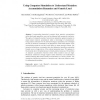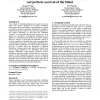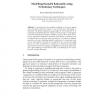141 search results - page 20 / 29 » Population Implosion in Genetic Programming |
ICCS
2007
Springer
14 years 1 months ago
2007
Springer
Long-standing theoretical concerns about mutation accumulation within the human population can now be addressed with numerical simulation. We apply a biologically realistic forward...
GECCO
2005
Springer
14 years 29 days ago
2005
Springer
Evolutionary models typically rely on a single level of evolution for training a team of cooperating agents. I present a model that evolves at two levels—an “organizational”...
GECCO
2007
Springer
14 years 1 months ago
2007
Springer
A new family of "Distribution Replacement” operators for use in steady state genetic algorithms is presented. Distribution replacement enforces the members of the populatio...
GECCO
2007
Springer
13 years 11 months ago
2007
Springer
The development of coherent and dynamic behaviors for mobile robots is an exceedingly complex endeavor ruled by task objectives, environmental dynamics and the interactions within...
AISB
1997
Springer
13 years 11 months ago
1997
Springer
A technique for the credible modelling of economic agents with bounded rationality based on the evolutionary techniques is described. The genetic programming paradigm is most suite...



